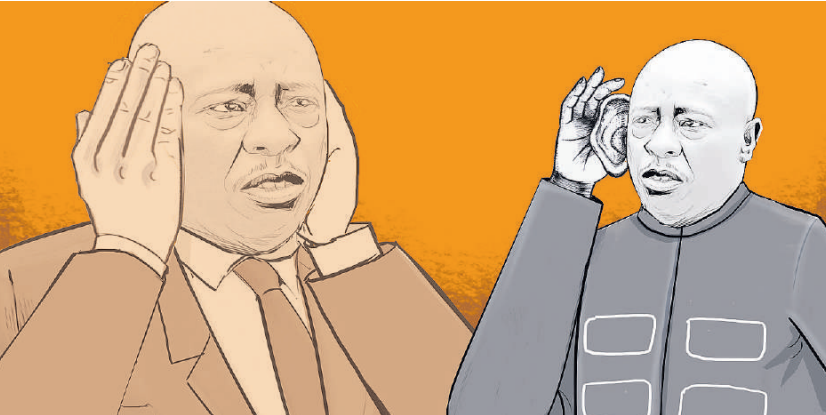
Former Deputy President Rigathi Gachagua has reemerged in the national conversation with a language makeover—referring to Kenyans as ‘cousins,’ ‘brothers’ and ‘sisters.’ To the uncritical ear, this might sound like a man seeking to unite a divided nation. However, beneath the sentimental slogans lies a more calculated agenda: political self-preservation rather than reconciliation.
Let us not sanitise the record. Gachagua did not leave office as a statesman or reformist. He was lawfully impeached following growing concerns about his divisive rhetoric, confrontational politics and persistent disregard for constitutionalism. His public conduct and controversial declarations not only made him a political liability but also a threat to national unity.
Today, he seeks a new audience—but instead of delivering substance, he offers carefully packaged sentimentality cloaked in kinship terms. This sudden rhetorical shift is not borne of transformation; it is a tactical rebranding by a politician who has realised that populism sells better in the language of family than in the vocabulary of exclusion. Gachagua is not new to reckless public declarations.
While in power, he famously described Kenya as a “company,” where only those who voted for the ruling coalition were entitled to enjoy the benefits of state resources. That was not a gaffe—it was a gross violation of Article 27 of the Constitution, which guarantees equal treatment under the law and a betrayal of Article 10, which outlines national values and principles of governance, including inclusivity, equity and non-discrimination. This rhetoric alienated regions, insulted communities and legitimised politics of exclusion.
That he now speaks the language of unity is politically ironic and morally hollow. His use of familial terms – ‘cousins,’ ‘brothers’ and ‘sisters’ – is not a new philosophy. It is a public relations manoeuvre intended to bury his legacy of division under a manufactured narrative of togetherness. Kenyans must not fall for it. It is important to remind the country that Gachagua’s impeachment was not political victimisation. It was the legal and political culmination of a troubling leadership style that undermined collective responsibility, inflamed intra-government tensions and repeatedly attacked national cohesion.
He was a principal architect of a regime that promised bottom-up economic transformation, yet now distances himself from it, offering only bitterness and insults in place of solutions. His removal from office was not just a constitutional milestone—it was a rejection of toxic ethnopolitics and a necessary course correction for the integrity of public leadership. Even more hypocritical is his sharp turn against the very regime he helped build.
As DP, he stood beside President William Ruto and played a visible role in crafting and defending the Kenya Kwanza agenda. Today, he has become one of its harshest critics – not through structured policy critique, but through rallies filled with vitriol, insults and political bile. Instead of presenting alternative economic ideas or legislative solutions, Gachagua offers soundbites that boil down to one mantra: “Ruto must go.” But leadership is not opposition for opposition’s sake. It is not enough to demand the downfall of another without a credible plan for what should replace it. You cannot dream of a destination without plotting the road to it. Gachagua’s politics are now driven by vengeance, not vision. His focus is not on building a better Kenya – it is on settling political scores and positioning himself for personal gain. Kenya is not a tribal confederation held together by surnames and bloodlines. We are a constitutional democracy, bound by rights, institutions and a shared national vision. The constitution recognises Kenyans as equal citizens – not as cousins of convenience. Gachagua’s kinship rhetoric dangerously attempts to rewrite our social contract: replacing the constitutional identity of citizenship with cultural sentimentality that appeals to tribal loyalty rather than legal equality.
This shift undermines efforts to build a modern, civic nation. Unity cannot be declared at the podium. It must be built through fairness in governance, inclusive economic policies and respect for the law. If the former DP is truly invested in national healing, let him begin by acknowledging his past missteps, publicly and unequivocally. Let him apologise to the communities he alienated and support constitutional reforms that empower all Kenyans, not just his political base.
Kenyans are tired of recycled rhetoric. They want accountability, equity and a future that isn’t built on tribal math. The youth, especially, are no longer moved by euphemisms or empty symbolism. They demand issue-based politics, not personal vendettas masked as populist crusades. Gachagua’s rebranding tour may earn him airtime, but it will not erase the public memory of his divisive past. The real test of leadership is not in coining slogans – it is in serving all Kenyans with dignity, justice and consistency. This country cannot be rebuilt by those who once tried to break it. It cannot be led by those who weaponise history while refusing to learn from it.













